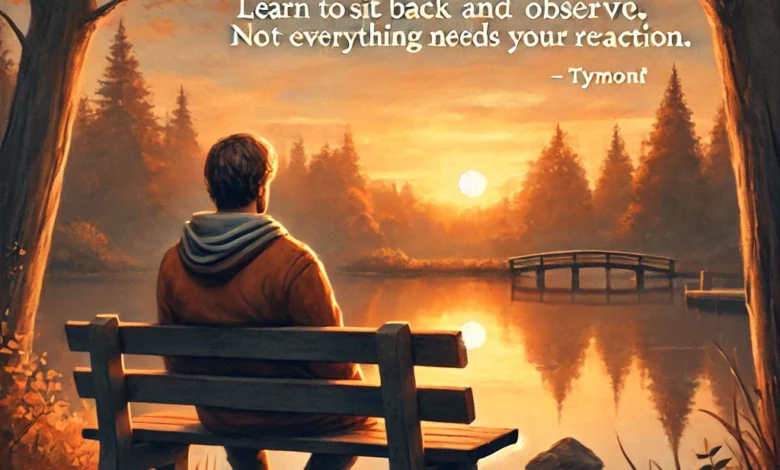Learn to Sit Back and Observe. Not Everything Need – Tymoff

In today’s fast-paced world, where everything moves at the speed of light and reactions are almost instantaneous, taking a step back to observe without immediate response has become an invaluable skill. The phrase, Learn to Sit Back and Observe. Not Everything Need – Tymoff, encapsulates a profound lesson in mindfulness and emotional intelligence that many of us overlook.
The Power of Observing Without Reacting
Observing without reacting is not about passivity or detachment. Instead, it is a conscious decision to assess situations, understand underlying motives, and respond more thoughtfully. In a world dominated by social media, news alerts, and the constant barrage of information, we are conditioned to react. Whether it’s the latest viral post, a political debate, or a personal situation at work or home, our first instinct is to react swiftly. But is this always the best course of action?
The answer is no. Learning to sit back and observe offers numerous benefits:
- Gaining Clarity: When you take a moment to observe without rushing to react, you gain a clearer understanding of the situation. Immediate reactions are often clouded by emotions, biases, or incomplete information. By observing, you give yourself the space to process facts and consider different perspectives.
- Avoiding Regrets: How many times have you regretted saying or doing something in the heat of the moment? Acting impulsively can lead to misunderstandings and unnecessary conflicts. By pausing to observe, you reduce the chances of making hasty decisions that you might later regret.
- Enhancing Emotional Intelligence: Observing without immediate reaction strengthens your emotional intelligence. It teaches you to manage your emotions, understand what triggers them, and learn how to respond in a way that aligns with your long-term values and goals.
- Improving Relationships: Whether in personal or professional settings, the ability to sit back and observe can significantly improve your relationships. Instead of reacting defensively or aggressively during a disagreement, observing helps you listen more intently and respond in a way that fosters understanding and respect.
Why Not Everything Needs Your Reaction
The urge to respond to everything stems from a mix of ego, the need for validation, and a conditioned fear of missing out (FOMO). But responding to every minor issue or provocation drains your energy and distracts you from what truly matters.
1. Energy Management
Not everything deserves your energy. Constantly reacting to every slight inconvenience or online controversy can leave you mentally and emotionally exhausted. By observing and selectively choosing what to engage in, you conserve your energy for the things that truly deserve your attention.
2. Fostering Inner Peace
Reacting to every stimulus can create a state of perpetual stress and agitation. Sitting back and observing without reacting helps cultivate inner peace. You learn to be comfortable with silence, inaction, and stillness. This is especially powerful in a culture that equates busyness with productivity.
3. Developing Wisdom
Wisdom is not gained from speaking or acting impulsively. It comes from reflection, deep thinking, and understanding. Observing without reacting allows you to learn from situations, absorb insights, and make better decisions over time.
Practical Tips to Master the Art of Observing
Mastering the art of sitting back and observing doesn’t happen overnight. It requires practice and self-awareness. Here are some practical tips to help you develop this skill:
- Practice Mindfulness: Mindfulness teaches you to be present in the moment without judgment. Incorporate mindfulness practices such as meditation or mindful breathing into your daily routine. This will train your mind to observe your thoughts and feelings without automatically reacting to them.
- Pause Before Responding: Whenever you feel the urge to react, take a moment to pause. Count to ten, take a few deep breaths, or even step away from the situation momentarily. This short pause can make a significant difference in how you choose to respond.
- Ask Yourself Questions: Before reacting, ask yourself questions like: “Is this worth my energy? What are the possible outcomes of my reaction? Will this matter a week from now?” These questions help you evaluate whether a response is necessary or beneficial.
- Observe Others: Pay attention to people who practice this skill well. Notice how they handle difficult situations with poise and how they often achieve better outcomes by choosing when and how to respond.
- Keep a Journal: Writing about your experiences can help reinforce your habit of observing before reacting. When you reflect on situations where you successfully paused and observed, it reinforces the behavior and helps you see its positive effects over time.
Benefits in Personal and Professional Life
The impact of learning to sit back and observe transcends all aspects of life. In your personal life, it can lead to better relationships, less stress, and improved mental health. You become more attuned to the needs and feelings of those around you, creating deeper connections.
In the professional realm, the ability to observe without immediate reaction is a sign of strong leadership. Leaders who practice this skill are often better at conflict resolution, decision-making, and maintaining a calm, composed demeanor even in high-pressure situations. This inspires confidence and trust among colleagues and team members.
Read more: Choice Home Warranty and George Foreman: Complete Guide to Protecting Your Home and Kitchen
Final Thoughts
In a world that constantly pushes for immediacy, the practice of sitting back and observing before reacting is both refreshing and essential. Tymoff’s simple yet profound statement, Learn to Sit Back and Observe. Not Everything Need – Tymoff, serves as a reminder that sometimes the best course of action is to pause, reflect, and choose your response wisely. The benefits—clarity, emotional control, and deeper connections—are well worth the effort.
Embracing this practice can lead to a more balanced, fulfilling life where you are not merely reacting to the world but thoughtfully engaging with it on your terms. So, take a step back, observe, and remember: not everything needs your reaction.



